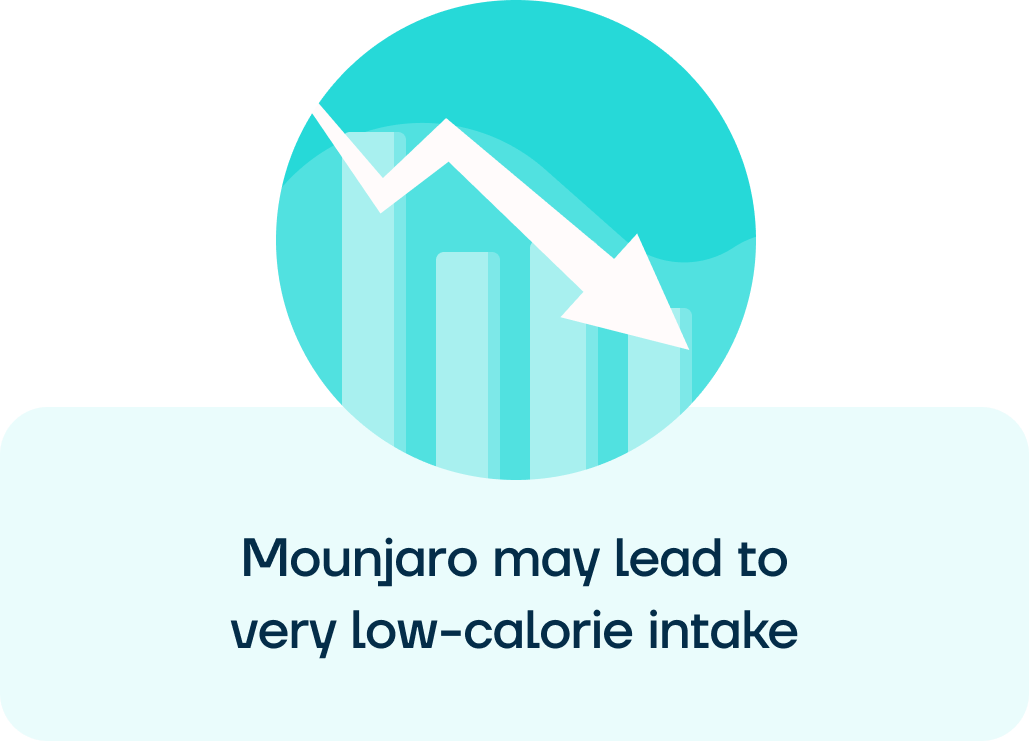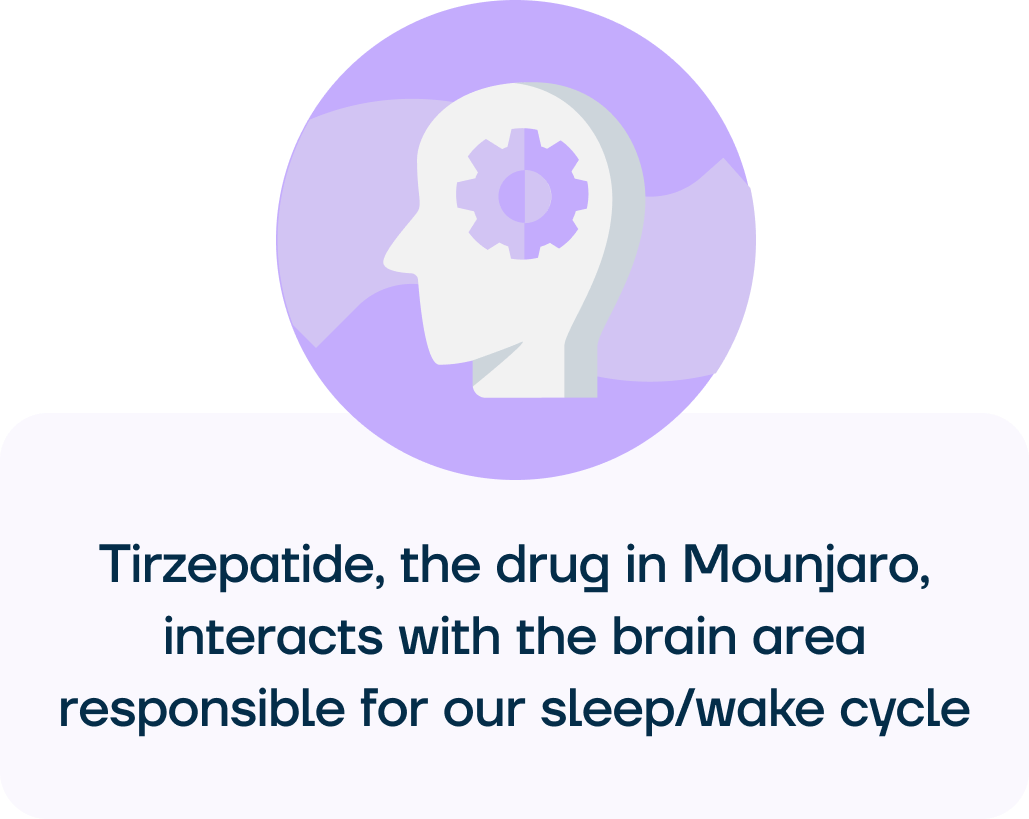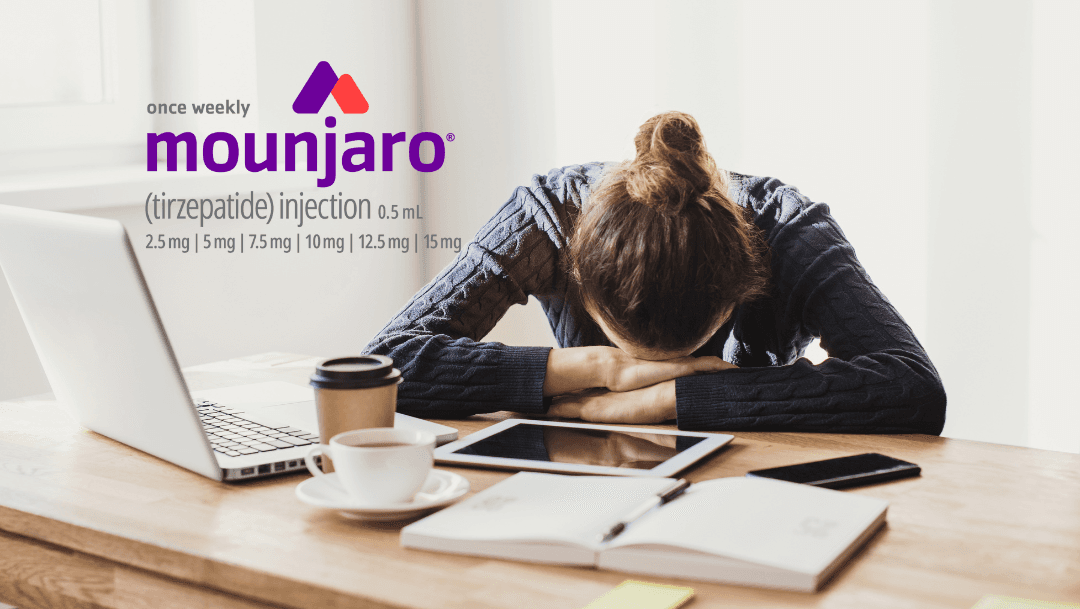Jump to: Why does Mounjaro make you feel tired? | Mounjaro may lead to very low-calorie intake | Mounjaro may impact our sleep/wake cycle | Take home message | Second Nature’s medication-supported weight-loss programmes
Feeling more tired than usual is a common side effect of Mounjaro (tirzepatide). It’s believed Mounjaro might make you feel tired because it lowers your calorie intake, and it interacts with an area of the brain responsible for regulating our sleep/wake cycle.
Fatigue (or feeling tired) is listed as a common side effect of Mounjaro, alongside nausea, vomiting, dizziness, and constipation.
However, this side effect is typically transient and will ease after the body adapts to the medication.
A paper recently published by Second Nature found that 44% of people on our medication-supported weight-loss programme reported ‘feeling more tired than usual’ after 4 weeks on a similar drug to Mounjaro called Wegovy.
Our study showed that after 8 weeks, the number of participants reporting ‘feeling more tired as usual’ had halved from 44% to 22%.
Why does Mounjaro make you feel tired?
Researchers aren’t entirely sure why Mounjaro makes you tired, as it’s not been explicitly studied yet.
However, here are two emerging theories as to why Mounjaro causes fatigue and tiredness:

1 – Mounjaro may lead to very low-calorie intake: This will cause the body to slow down metabolism to preserve existing energy stores. This response can make you feel more tired than usual.

2 – Tirzepatide, the drug in Mounjaro, interacts with the brain area responsible for our sleep/wake cycle: It’s possible Mounjaro is having an indirect effect on our brain’s internal clock, interrupting our normal sleep patterns, and making us feel more tired than usual.
Fortunately, there are ways to mitigate the effects of Mounjaro on our energy levels.
Let’s analyse the two theories of why Mounjaro makes you feel more tired than usual in more depth and provide simple ways to boost your energy levels on Mounjaro.
1) Mounjaro may lead to very low-calorie intake
The first theory of why Mounjaro makes you feel more tired than usual is that tirzepatide (the drug in Mounjaro) reduces appetite, so we may not eat enough food to support our energy levels.
As we know, tirzepatide can lower our hunger to the point where we have little desire to eat. This could lead to consuming too little energy or calories from food to support our body’s essential functions.
Low energy intake can lead to tiredness and fatigue as the body responds by slowing down our metabolism to conserve as much energy as possible.
Metabolism is the sum of all the energy burnt in our body to fuel our organs and daily activities.
This means that our body saves energy for the functions it prioritises, like digestion and keeping our organs working properly while de-prioritising energy for movement and keeping us feeling awake.
Here’s a list of Second Nature’s top tips to ensure you’re eating enough to avoid feeling tired on Mounjaro:
- Eat three balanced meals a day (even if you’re not particularly hungry)
- Include protein-rich snacks in between your meals if you need
- Do what you can to make your meals more palatable so you enjoy them more (which might help you finish them)
- Make your meals easier to eat and digest by cooking your vegetables, opting for minced meat, and enjoying soft fruit with your breakfast
2) Mounjaro interacts with areas of the brain responsible for our sleep/wake cycle
The second theory why Mounjaro may make us feel more tired than usual is its potential impact on our sleep/wake cycle.
Our bodies have an internal clock that’s found in the brain. This clock is regulated by the hypothalamus, a part of the brain that releases hormones to either stimulate us to be awake or sedate us to feel sleepy.
Our internal clock determines our circadian rhythm, the 24-hour biological cycle that influences many internal functions, also known as the sleep/wake cycle.
This clock also takes signals from the external environment, including light and darkness, which we call time cues.
Interestingly, the hypothalamus is also responsible for our hunger and appetite, which is why it’s the target of Mounjaro.
The ability of Mounjaro to influence our hunger levels via the hypothalamus in the brain may also have unintended effects on our sleep-wake cycle by disrupting the function of our internal clock.
One study in rats found that another GLP-1 medication with similar effects to tirzepatide, Saxenda (liraglutide), lowered wakefulness and changed the rat’s sleep patterns.
This suggests a potential link between GLP-1 medications and our energy levels, but as this is an animal study, we can’t be sure it would translate to humans.
No research has been carried out on humans investigating the effects of tirzepatide on our sleep/wake cycle.
However, here’s a list of ways to boost your energy levels and lower your feelings of fatigue and tiredness on Mounjaro:
- Have a regular sleep schedule: Go to bed at the same time each night and wake up at the same time
- Get morning daylight exposure: The type of light emitted in the early hours of the day helps to set our body’s internal clock, helping you feel energised during the day and more tired at night
- Avoid caffeine after midday: Caffeine can take 12-24 hours to leave the body and can harm our sleep quality.
- Avoid screens and bright lights before bed: Try and turn down the brightness of the lights in your house in the evening and avoid screens before bed.
Take home message
Fatigue and feeling more tired than usual are common side effects of Mounjaro. However, these effects are typically transient and will ease after our body has adapted to the medication.
Researchers aren’t entirely sure why Mounjaro causes fatigue and tiredness, but it’s possibly due to low-calorie intake and its impact on our sleep/wake cycle.
Ensuring you’re eating a reasonable amount of healthy, nutritious food and setting a regular bedtime schedule could help mitigate the impact of Mounjaro on how tired you feel.
Weight-loss injections aren’t a magic pill
Weight-loss injections are most effective when combined with a healthier lifestyle. They can help kickstart weight loss while you commit to developing healthier habits.
Mounjaro and other weight loss injections, like Ozempic and Wegovy, can allow you to make lifestyle changes to support long-term weight loss.
These medications can help silence food-related thoughts and give you a boost of confidence with more immediate weight-loss results.
They can also buy you the time and headspace to understand why your body may have struggled to lose weight and build new long-term healthy habits.
The core focus of our medication programmes is to calm down the feeling of food noise, lower your cravings, and allow you to build healthier habits to keep the weight off for good.
The ultimate goal is to make losing weight feel second nature.
Second Nature’s medication programme
Second Nature currently provides Mounjaro as part of our Mounjaro weight-loss programme.
Why should you choose Second Nature over other medication providers if you’ve decided to try Mounjaro (assuming you’re eligible)?
For peace of mind.
Second Nature has worked with the NHS for over 6 years providing weight-loss programmes across the UK.
While our Mounjaro weight-loss programme is private and not currently used by the NHS, we’ve built the programmes focusing on scientific evidence, patient safety, and data security.
We hope that our 6+ years of working with the NHS and building a track record of trust and effective weight-loss results will give you peace of mind to give us a try.






